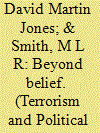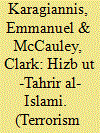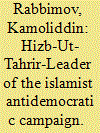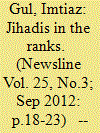| Srl | Item |
| 1 |
ID:
095295


|
|
|
|
|
| Publication |
2010.
|
| Summary/Abstract |
The development of radical Islamist strategic thinking and the impact of post-modern, Western styles of thought upon the ideology that informs that strategy is often overlooked in conventional discussions of homegrown threats from jihadist militants. The propensity to discount the ideology informing both al-Qaeda and nominally non-violent Islamist movements with an analogous political philosophy like Hizb ut-Tahrir neglects the influence that critical Western modes of thought exercise upon their strategic thinking especially in the context of homegrown radicalization. Drawing selectively on non-liberal tendencies in the Western ideological canon has, in fact, endowed Khilaafaism (caliphism) with both a distinctive theoretical style and strategic practice. In particular, it derives intellectual sustenance from a post-Marxist Frankfurt School of critical thinking that in combination with an "English" School of international relations idealism holds that epistemological claims are socially determined, subjective, and serve the interests of dominant power relations. This critical, normative, and constructivist approach to international relations seeks not only to explain the historical emergence of the global order, but also to transcend it. This transformative agenda bears comparison with radical Islamist critiques of Western ontology and is of interest to Islamism's political and strategic thinking. In this regard, the relativist and critical approaches that have come to dominate the academic social sciences since the 1990s not only reflect a loss of faith in Western values in a way that undermines the prospects for a liberal and pluralist polity, but also, through a critical process facilitated by much international relations orthodoxy, promotes the strategic and ideological agenda of radical Islam. It is this curious strategic and ideological evolution that this paper explores.
|
|
|
|
|
|
|
|
|
|
|
|
|
|
|
|
| 2 |
ID:
069624


|
|
|
| 3 |
ID:
052474


|
|
|
| 4 |
ID:
118621


|
|
|
| 5 |
ID:
077748


|
|
|
|
|
| Publication |
2007.
|
| Summary/Abstract |
Hizb ut-Tahrir is a transnational Islamic movement that aims to unify Muslims worldwide under a single Caliphate. The group presents a particularly difficult challenge to the Kazakh government, since it holds radical views but advocates only peaceful change. The article shows how social movement theory can illuminate the emergence of Hizb ut-Tahrir in southern Kazakhstan. Furthermore, it suggests that the group's ideology can be understood as a powerful and integrative basis for collective action
|
|
|
|
|
|
|
|
|
|
|
|
|
|
|
|
| 6 |
ID:
139103


|
|
|
|
|
| Summary/Abstract |
Although the environmental movement was established in the West, there is currently an Islamist variant that has received less attention. The Quran and the Hadiths provide guidance for the faithful on the relationship between Allah, humanity and nature. The article will examine and compare the environmental agendas of six Islamist groups: Hizb'allah, Hizb ut-Tahrir, Hamas, the Muslim Brotherhood, Jamaat-e-Islami, and al Qaeda. While they all share similar concerns, Islamists have developed globalized, glocalized, or localized ‘scales’ of engagement, depending on the targeted audience. Finally, the article will examine the security implications of Islamist environmentalism, including the possibility of an alliance between Islamists and militant environmentalists.
|
|
|
|
|
|
|
|
|
|
|
|
|
|
|
|